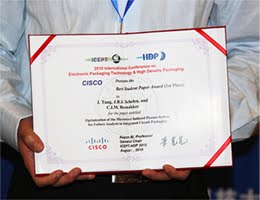ICEPT 2010
ICEPT 2010
“Optimization of the Microwave Induced Plasma System for Failure Analysis in Integrated Circuit Packaging”
J. Tang, J.B.J. Schelen, and C.I.M. BeenakkerIEEE International Conference on Electronic Packaging Technology & High Density Packaging (ICEPT 2010).
This work is done in collaboration with NXP Semiconductors.
This work is awarded "Best Paper Award" at ICEPT 2010 conference.

Abstract:
Decapsulation of plastic Integrated Circuit (IC) packages is an important step in package level failure analysis. In this paper, optimization of a Microwave Induced Plasma (MIP) system for plastic IC package decapsulation is described. An improvement on the microwave coupling of the MIP system is achieved and microwave power reflection is reduced from more than 50% to less than 15%. Results on oxygen plasma etching of IC package samples showed that decapsulation by only oxygen plasma is not practical. Results on oxygen and carbontetrafluoride mixture plasma showed an etch rate of 0.55 mm3/min at 390°C effluent temperature. High selectivity ensured the copper wires to be intact after decapsulation. Parameters that affect plasma etching performance are discussed and results are shown to prove the high efficiency of this MIP decapsulation method.Link to the document
